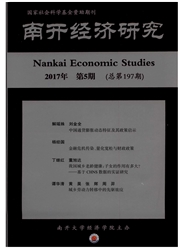

 中文摘要:
中文摘要:
本文在贸易引力模型的基础上,将制度因素纳入到双边贸易模型的分析框架中,并利用2000—2005年期间世界224个国家之间6492(1082×6)个双边贸易观测值组成的面板数据,从国际层面考察了制度因素对31个发展中国家对外贸易的影响。研究结果表明:发展中国家与贸易伙伴国之间的制度差距会增加贸易成本,不利于双边贸易往来;发展中国家提高金融市场的自由化程度和政府的清廉程度,有利于对外贸易的发展;发展中国家对外贸易发展与政府规模、商业自由程度表现为倒U型曲线特征;在经济发展到一定水平以后,发展中国家提高投资自由化度不利于对外贸易的发展,提高产权的保护程度有利于对外贸易的发展。因此,在不同的发展阶段,发展中国家应该根据不同制度因素的影响作用,对各种制度进行改革和调整,促进本国对外贸易的发展。
 英文摘要:
英文摘要:
This article brought institutions into the frame of bilateral trade model and gravity model,and investigated the effect on trade produced by them.According to the empirical study based on panel data running from 2000 to 2005 for 1082 bilateral trade country pairs,we draw the conclusion that institutions exert significant influence on foreign trade of devel-oping countries.Developing countries should be orientated towards the promotion of eco-nomic strength,enhance the cooperation with their surrounding countries,and perfect the domestic institutional environment as well as trade strategies according to the effects of various institutions.
 同期刊论文项目
同期刊论文项目
 同项目期刊论文
同项目期刊论文
 期刊信息
期刊信息
